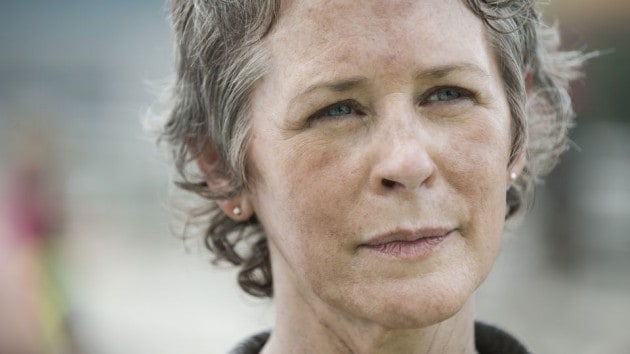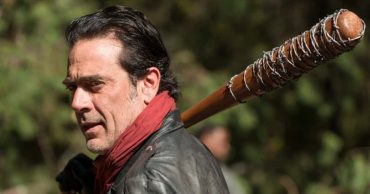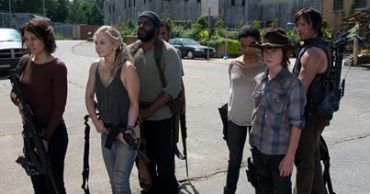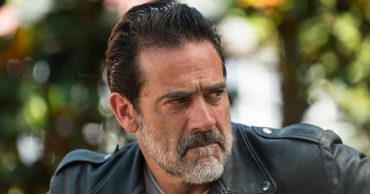
The Walking Dead ended its fifth season without killing any members of the core group, which some seemed to be disappointed with, but I don’t think every season finale has to murder a main castmember in order to be considered a success. In fact, I quite liked the ninety-minute finale, even if it was, at times, an awful lot of standing around and talking.
What was most interesting about the episode was that we’re now seeing The Walking Dead slip into a sort of DC Comics style debate about the philosophy of killing, or not killing. We saw a few different philosophies on display, and I wanted to talk through each of them
1. Morgan
In this episode, we’re re-introduced to Morgan at long last, which fans have been anticipating for a while now. He’s gone from timid survivalist in the first season, to crazy hermit after his son died, to now sort of a Book of Eli-style monk who believes in non-violence against other humans.
This philosophy even extends to bandits who want to steal all his things and kill him. In the intro, he has a run-in with the Wolves, who we get to meet for the first time, and even though he dispatches them with his monk bow-staff skills (seriously, who taught him that?), he leaves the two of them unconscious and even in a car so the walkers won’t get them.
2. Glenn
Glenn’s arc this week has to do with his ongoing feud with Nicholas, whose cowardice got Noah killed two weeks ago. Nicholas climbs over the wall in an apparent attempt to lure Glenn out, and it works. Glenn follows him into the woods, and Nicholas shoots him from cover. Glenn survives, attacks Nicholas, then is left for dead again as walkers swarm him and Nicholas runs.
Glenn somehow survives and tracks down Nicholas again, and then has him at gunpoint. Somehow, this man who has gotten one of Glenn’s friends killed, has left him for dead twice, and tried to kill him twice, gets forgiven. Glenn not only doesn’t shoot him, but he helps him back to camp.
3. Rick
When Rick discovered than Pete was beating his wife, his first instinct (and Carol’s) was to kill him. That may have seemed like an extreme punishment for the crime, but it’s clear now that the worry was the Pete would do something even worse, and actually kill her the next time.
In the end, Pete did kill someone, Deanna’s husband, albeit by accident. He sliced open his throat with Rick’s sword, and as a result, Deanna finally gave Rick the greenlight to do what he wanted to do all along, execute him on the spot.
Looking at all three of these philosophies, it’s hard to argue that forgiveness, second chances and non-violence have all that much of a place in the world any more. Morgan’s philosophy, for example, let those Wolves go free, and in the end, they picked up the red-hooded survivor (get the Little Red Riding Hood reference there?) who may have lived if Morgan had killed them. Granted, there are probably more Wolves, but when someone is that screwed up and evil, it’s hard to argue for not killing them, but literally setting them free to go rob/murder others.
Glenn’s circumstance is a little different, because at least Nicholas was someone he knew, and not some random bandit who would readily kill them. It remains to be seen if Nicholas will do something in the future to make Glenn regret saving/forgiving him, or if possibly Nicholas will see the light and become a valuable member of the group, perhaps saving someone else when the situation calls for it next time.
Rick’s philosophy is the most straightforward. You screw up, you cause harm directly or indirectly, you die. Doesn’t matter if you’re a doctor or a beloved member of the community, you are too dangerous to be in this world. Rick clearly would have killed both Wolves without blinking, and would have easily executed Nicholas if he had been in Glenn’s shoes.
Then again, what if Rick had decided to execute Carol for her “crimes” instead of exiling her back when they were at the prison? Carol was the one who singlehandedly saved their entire group from the Terminus cannibals. If Rick had carried out this brand of justice for her murders, it’s entirely possible none of them would be alive today.
I suppose this is why in the real world we have a court system which doles out all manner of punishments and takes context into account as well. But it’s hard to know the butterfly effect of killing and not-killing in the world of The Walking Dead. I’m reminded of season two when Carl failed to kill a walker, and that same walker ended biting Dale a short while later. Actions have consequences you can never see coming.
I think the Morgan/Wolves situation is obvious, but the others are shades of grey. Should Glenn have killed Nicholas? Should Rick have just locked up Pete? What do you think?
[Photo via AMC]
 Follow Us
Follow Us





